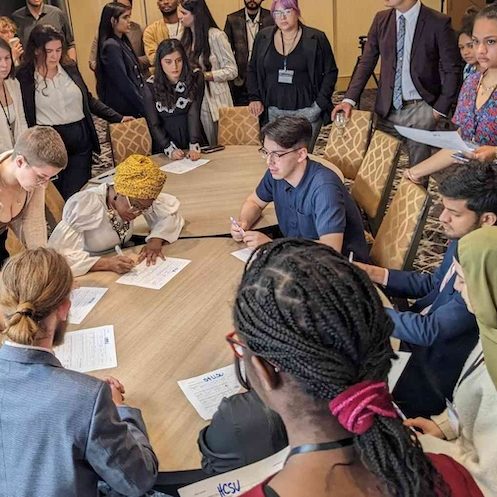Guest Entry
READING TIME: 4 MINUTES
Canada’s humanitarian mask is slipping — and the world should see it. In the desert dust of northeast Syria sits Al-Hol, a sprawling detention camp where over 50,000 people — mostly women and children — live in desperate, degrading conditions. Among them are Canadian citizens, and yet Canada has done almost nothing.

A view of al-Hol displacement camp in Hasaka governorate, Syria (Ali Hashisho/Reuters)
For years, the Canadian government has refused to take meaningful steps to bring its own nationals home. This isn’t a case of diplomatic delay or bureaucratic red tape — it is active abandonment, cloaked in silence and cowardice. At a time when Canada claims to champion human rights on the global stage, it has left its most vulnerable — children, women, and stateless citizens — to rot in makeshift tents, surrounded by violence, sickness, and uncertainty.
What is happening in these camps is not a security problem — it is a humanitarian disaster. Children with no access to education. Women with untreated injuries and trauma. Entire families living under tarps in unsanitary, unsafe conditions. These are Canadian citizens, entitled to due process, medical care, and the protection of the state. Instead, they have been completely abandoned. For many, including young children born to Canadian mothers, their only experience of life is confinement. They are not criminals. They have not been tried or convicted of anything. And yet they are being punished indefinitely, with no legal pathway forward.
Canada’s government has had every opportunity to act. Human rights organizations have begged for repatriation. Canadian courts have ruled that the government has a duty to bring these citizens home. International partners, including the U.S., have offered assistance. Still, Canada has dragged its feet, made excuses, and delayed action — all while children continue to suffer. There is no justification for this inaction. If individuals are suspected of wrongdoing, bring them home and prosecute them under Canadian law. That is how a real democracy functions. But Canada has chosen the easy way out: silence, denial, and the outsourcing of responsibility to a conflict zone. It has handed over the fate of its citizens to armed groups and failing camps, rather than upholding justice within its own borders.
The case of Shamima Begum, though British, is emblematic of how Western countries have scapegoated women instead of seeking real solutions. In Canada, similar cases have been ignored, hidden, or handled quietly in courtrooms without public transparency. Even children — some as young as toddlers — have been treated as threats rather than protected as innocent victims of war. What is this, if not cowardice? Canada claims to support global justice, peacekeeping, and human rights — yet it refuses to protect its own citizens when it’s politically inconvenient. If you cannot defend the rights of our most vulnerable, then what do those values mean? Maybe Canada should stop dictating other countries about human rights and women rights and instead look at itself in the mirror.
This isn’t just a foreign policy failure — it is a moral failure. And it doesn’t stop there. Canada’s treatment of its Muslim citizens — especially those caught in complex international situations — reflects a deeper issue of exclusion. Instead of supporting Muslim youth, offering spaces for community, faith, and identity, and building real inclusion, the government too often resorts to surveillance, fear-based policies, and silence. The problem goes deeper.
Canada’s Muslim citizens often face alienation, discrimination, and lack of inclusion. If we want to prevent future crises, our government must actively support these communities by funding Islamic centres, offering culturally sensitive services, and fostering true belonging. Without this, isolation breeds vulnerability.

UNICEF
If Canada truly wants to prevent alienation and future radicalization, it must invest in Muslim communities, not marginalize them. That means:
• Funding Islamic community centres, youth programs, and education.
• Ensuring access to halal food, prayer spaces, and religious accommodations in public institutions.
• Creating mental health support systems that understand trauma and cultural context.
• Building more mosques and funding them.
• Listening to the concerns of Muslim citizens rather than sidelining them.
Canada doesn’t need to become something new — it simply needs to live up to its own values. If it truly believes in justice, then justice must apply to all — including those who are unpopular, forgotten, or politically inconvenient. Every day that Canada fails to repatriate its citizens from Al-Hol, it reinforces a chilling message: some lives are not worth protecting.
It’s time for Canada to stop hiding. Bring its citizens home. Let the courts decide what justice looks like. And most importantly, start acting like a country that believes in human rights — not just one that advertises them. For all we know as of now, Canada is a shameful hypocrite; a country that preaches rights, then abandons its own citizens like a coward.



